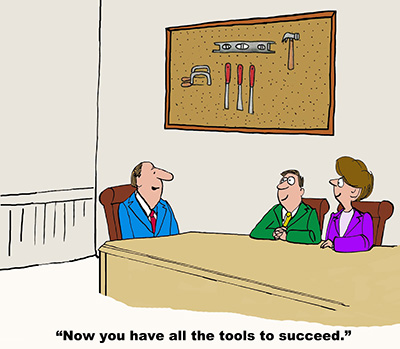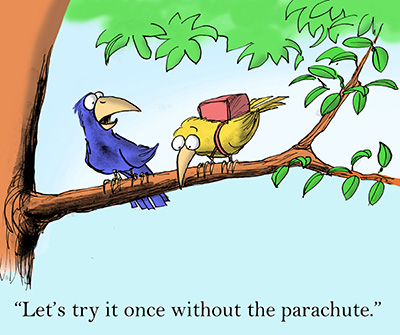Look beyond negotiation training and theory to develop negotiation skills.
In your position, you likely face negotiation situations every day. Developing negotiation skills is critical for leaders and managers worldwide. Negotiation skills training will help you get part of the way there, but you need to look beyond simply learning negotiation tactics to develop the habits that will help you apply negotiation strategy to real-world situations confidently and successfully.
Learn
 The first step in developing negotiation skills is to learn the fundamentals of negotiation. This includes learning how to use a negotiation model that defines the process of preparing for, implementing, and concluding a negotiation. A good negotiation skills training course will also include negotiation tactics and psychology that will help give you an edge during negotiations.
The first step in developing negotiation skills is to learn the fundamentals of negotiation. This includes learning how to use a negotiation model that defines the process of preparing for, implementing, and concluding a negotiation. A good negotiation skills training course will also include negotiation tactics and psychology that will help give you an edge during negotiations.
Simulate
Your negotiation skills training class should also include a simulation portion, so you can put the information you learn in theory into practice in a safe environment. In a live, interactive training course, negotiation simulation gives you the opportunity to work with other managers in your area. In this setting, you are able to learn from others’ experiences and perspectives, as well as through providing and receiving constructive feedback.
While this type of role-play learning can be uncomfortable for some people, the inclusion of simulation to develop negotiation skills is critical. As Harvard Law School puts it: Engaging in negotiation role-plays improves students’ motivation and retention of key concepts that have already been taught in lectures and classroom discussions. Thus, classes that combine simulations with more traditional classroom methods may maximize learning.
So, open yourself up to a little discomfort during negotiation training, it will help put you more at ease in future negotiations when there is more at stake!
Planning & Accountability
Taking a negotiation training course alone will only get you so far in developing negotiation skills that will get results for you and your organization. You have to commit to applying and practicing those skills on an on-going basis to develop mastery. This is where creating a formal action plan becomes very important for your success. You will likely learn A LOT in the Learn and Simulate steps to developing negotiation skills. Take out 3 to 5 key ideas from those learnings and create a plan for how you will apply them. For example, one of the goals in your action plan may be to “spend at least 5 hours researching, preparing, and planning for my next negotiation.”
Your action plan is your roadmap to success, so you have to be held accountable for implementing your plan and achieving your goals. Most people find it difficult to hold themselves accountable, so they work with an accountability partner, such as a colleague, supervisor, friend, or partner. Some training courses will have accountability and measurement check-ins built into the program to keep managers on track to reaching their goals.
Apply
 No good ever came out of learning new skills that are never applied. You will not develop negotiation skills or experience results from improved negotiations if you do not apply them in real life!
No good ever came out of learning new skills that are never applied. You will not develop negotiation skills or experience results from improved negotiations if you do not apply them in real life!
Sadly, many managers will learn new skills, only to revert to their old ways because it’s easier and more comfortable. Developing new skills can be tough, and applying them in the real world is intimidating. Refer back to your plan when you are starting to feel this way. Take application one step at a time if that works better for you. The important thing is to start applying those skills right way, before you forget about them, to start forming the habits of great negotiators.
In your next negotiation situation, even if it seems insignificant, think about the negotiation model you have learned and apply it to the current negotiation. Take one or two new tactics or ideas that you learned and apply it to the situation as well. Then, continue to build on that with your action plan goals and practice, practice, practice!
Repeat
After applying your new negotiation skills in real-world negotiations, take the time to reflect on how that adjustment helped you. Did it help improve the outcome of the negotiation? Did you create value for your organization as a result? Were you able to build (or maintain) the relationship with the other party? Also think about what went well and what you would change for next time, then repeat.
Apply your new negotiation skills over and over again to create a habit, so that great negotiation skills become second nature to you. Once the first 3 to 5 goals on your action plan are met through practice and refinement, consider what goals you can add to continue to grow as a manager. What other management skills might you need to develop to become a stronger leader and continue creating value for yourself and your organization?






